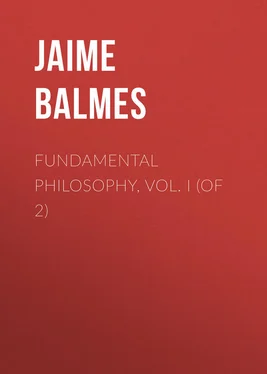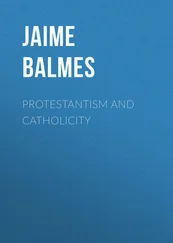Jaime Balmes - Fundamental Philosophy, Vol. I (of 2)
Здесь есть возможность читать онлайн «Jaime Balmes - Fundamental Philosophy, Vol. I (of 2)» — ознакомительный отрывок электронной книги совершенно бесплатно, а после прочтения отрывка купить полную версию. В некоторых случаях можно слушать аудио, скачать через торрент в формате fb2 и присутствует краткое содержание. Жанр: foreign_antique, foreign_prose, на английском языке. Описание произведения, (предисловие) а так же отзывы посетителей доступны на портале библиотеки ЛибКат.
- Название:Fundamental Philosophy, Vol. I (of 2)
- Автор:
- Жанр:
- Год:неизвестен
- ISBN:нет данных
- Рейтинг книги:3 / 5. Голосов: 1
-
Избранное:Добавить в избранное
- Отзывы:
-
Ваша оценка:
- 60
- 1
- 2
- 3
- 4
- 5
Fundamental Philosophy, Vol. I (of 2): краткое содержание, описание и аннотация
Предлагаем к чтению аннотацию, описание, краткое содержание или предисловие (зависит от того, что написал сам автор книги «Fundamental Philosophy, Vol. I (of 2)»). Если вы не нашли необходимую информацию о книге — напишите в комментариях, мы постараемся отыскать её.
Fundamental Philosophy, Vol. I (of 2) — читать онлайн ознакомительный отрывок
Ниже представлен текст книги, разбитый по страницам. Система сохранения места последней прочитанной страницы, позволяет с удобством читать онлайн бесплатно книгу «Fundamental Philosophy, Vol. I (of 2)», без необходимости каждый раз заново искать на чём Вы остановились. Поставьте закладку, и сможете в любой момент перейти на страницу, на которой закончили чтение.
Интервал:
Закладка:
I. So far is Leibnitz from advocating universal identity, that he establishes an infinite plurality and multiplicity: his monads are beings really different and distinct among themselves.
II. The whole universe, composed of monads, proceeded, according to Leibnitz, from one infinite monad; and this procession was not by emanation, but by creation.
III. In the infinite monad, in God, Leibnitz places the sufficient reason of every thing.
IV. Knowledge has been freely given by God himself to the monads.
V. This knowledge, and the consciousness of it, belong to the monads individually, and Leibnitz never even remotely took into consideration this foundation of all things, which by its transformation ascends from nature to consciousness, or descends from the region of consciousness and is converted into nature.
110. These differences so marked need no comments; they show most evidently that the philosophers of modern Germany cannot shield themselves under the name of Leibnitz; although, in truth, these philosophers have no failing of that kind: far from seeking guides, they all aspire to originality, and this is one principal cause of their extravagance, Hegel, Schelling, and Fichte, all pretend to be founders of a philosophy; and Kant was so governed by the same ambition, that he made very important alterations in the second edition of his Critic of Pure Reason , lest he should be taken for a plagiarist from Berkeley's idealism. (10) Конец ознакомительного фрагмента. Текст предоставлен ООО «ЛитРес». Прочитайте эту книгу целиком, купив полную легальную версию на ЛитРес. Безопасно оплатить книгу можно банковской картой Visa, MasterCard, Maestro, со счета мобильного телефона, с платежного терминала, в салоне МТС или Связной, через PayPal, WebMoney, Яндекс.Деньги, QIWI Кошелек, бонусными картами или другим удобным Вам способом.
CHAPTER XI.
PROBLEM OF REPRESENTATION EXAMINED
111. All our knowledge is by representation, without which it would be inconceivable; and yet what is representation in itself considered? We cannot say: it enlightens us as to other objects, but not as to itself.
It is obvious that we do not attempt to conceal the very grave difficulties which the solution of this problem offers: on the contrary, we point them out with all clearness, in order to avoid that vain presumption which is as fatal to science as to every thing else. But let it not be supposed that we intend to banish this question from the arena of philosophy: for many and serious as are its difficulties, we are yet of opinion that they allow of sufficiently probable conjectures.
112. The representative force may emanate from any one of these three sources: identity, causality, or ideality. We will explain ourselves. A thing may represent itself; and this we call representation of identity. A cause may represent its effect; and this is what we understand by representation of causality. A being, whether substance or accident, may represent another distinct from itself, which is not its effect; and this we call representation of ideality.
We do not see how it is possible to assign any other source of representation: holding, therefore, the division to be complete, we will examine its three points; and we beg to call the attention of the reader more especially to this matter, because it is one of the most important in philosophy.
113. That which represents must have some relation to the thing represented: whether essential or accidental, inherent or communicated, this relation must exist. Two beings, having absolutely no relation, one of which nevertheless represents the other, are a monstrosity. There is nothing without a sufficient reason; and there being no relation between the thing representing, and that represented, there is no sufficient reason of the representation.
It is here to be borne in mind that, for the present, we abstract the nature of this relation; we do not assert it to be either real or ideal; we only say that, between the thing representing and that represented, there must be some link, whatever that link may be. Its mysteries, its incomprehensibility, do not destroy its existence. Philosophy perhaps may be unable to explain the enigma; but it can demonstrate the existence of the link. Thus, abstracting all experience, it is possible to demonstrate a priori , that there is a relation between the me and other beings, by the mere fact of their representation existing in the me .
The incessant communication of intelligences with each other, and with the universe, proves that there is a point of union for them all. Representation, alone, is a convincing proof of this: so many beings, apparently dispersed and unconnected, are intimately united in some centre, so that the simple phenomenon of intelligence leads us to affirm the common link, the unity in which plurality is joined. This unity, with pantheists, is universal identity; with us, it is God.
114. Here observe that this relation between the thing representing and that represented, is not necessarily direct or immediate; it suffices that it be with a third object: thus, they who explain representation by identity, and they who account for it by intermediate ideas, must equally admit it; for, on the present matter, there is no difference between those who hold these ideas to be produced by the action of objects upon our mind, and those who make them proceed immediately from God.
115. Whatever represents any thing, contains in some sense the thing represented; for an object cannot be represented unless it is in some manner or other in the representation. It may be the object itself, or its image; but this image cannot represent the object, unless it is known to be its image. Every idea then involves the relation of objectivity; otherwise it could not represent the object, but only itself. The act of intelligence is immanent, but in such a manner, that the intellect does not need to go out of itself to attain its object. When we think of a star a million leagues distant, our mind certainly does not go to the point where the star is; but by means of the idea, it destroys in an instant this immense distance, and unites itself with the star. What it perceives is not the idea, but its object: if this idea did not involve a relation to the object, it would cease to be an idea to the mind, and would represent nothing except itself.
116. There is then, in every perception, a connection of the being that perceives with the thing perceived. When this perception is not immediate, the medium must be such as to contain a necessary relation to the object; it must conceal itself in order to offer to the eye of the mind only the thing represented. From the instant that it presents itself, and is seen, or even noticed, it ceases to be an idea and becomes an object. The idea is a mirror, which is most perfect when it creates the most perfect illusion. It must necessarily present only the objects, and project them at the proper distance, without allowing the eye to see the crystalline plane which reflects them.
117. This union of the thing representing, with that represented, of the intellect with its objects, may, in some instances, be explained by identity. In general, no contradiction is discovered in any thing representing itself to the eye of the understanding, if we suppose them to be united in some way or other. In case then that the thing known is itself intelligent, we see no difficulty in its being its own representation, and consequently none in confounding ideality and reality in the same being. If an idea can represent an object, why may it not represent itself? If an intelligent being can know an object through the medium of an idea, why may it not know that object immediately? The union of the thing known with the intellect is to us a mystery, it is true; but is the union effected by the medium of an idea less so? To the idea may be objected all that can be brought against the thing itself; and it is even more inexplicable how one thing represents another, than how it represents itself. The thing representing and that represented, have between them a sort of relation of containing and contained. It is easily conceived that the identical contains itself, since identity expresses much more than to contain; but it is not so easily conceived how the accident can contain the substance, the transitory the permanent, the ideal the real. Identity is then a true principle of representation.
Читать дальшеИнтервал:
Закладка:
Похожие книги на «Fundamental Philosophy, Vol. I (of 2)»
Представляем Вашему вниманию похожие книги на «Fundamental Philosophy, Vol. I (of 2)» списком для выбора. Мы отобрали схожую по названию и смыслу литературу в надежде предоставить читателям больше вариантов отыскать новые, интересные, ещё непрочитанные произведения.
Обсуждение, отзывы о книге «Fundamental Philosophy, Vol. I (of 2)» и просто собственные мнения читателей. Оставьте ваши комментарии, напишите, что Вы думаете о произведении, его смысле или главных героях. Укажите что конкретно понравилось, а что нет, и почему Вы так считаете.












